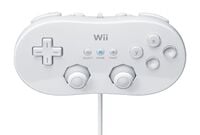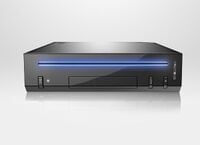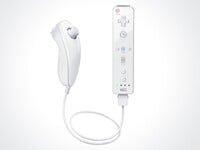Wii: Difference between revisions
Son of Suns (talk | contribs) mNo edit summary |
m (Moving image to reduce the huge unneeded space.) |
||
| Line 10: | Line 10: | ||
{{LLQuote|While the code-name "Revolution" expressed our direction, Wii represents the answer.|[[Nintendo]]|about the name "Wii".}} | {{LLQuote|While the code-name "Revolution" expressed our direction, Wii represents the answer.|[[Nintendo]]|about the name "Wii".}} | ||
[[Image:Revolution.jpg|thumb|left|The prototype appearance of Wii codenamed '''Revolution'''.]] | |||
[[Image:Revolution.jpg|thumb| | |||
The '''Wii''' is a [[Nintendo]] console that was released on November 19, 2006 in the USA for $249.99. In every country except Japan, ''Wii Sports'' was included with the Wii. For ''Wii Sports'', in a conference, [[Shigeru Miyamoto]] explained how when they were creating the baseball game, they originally had ''Mario'' characters rather than the Mii characters, but soon decided to change it. The Wii came with 30 titles at its launch. Before the official name was announced on April 27, it was codenamed ''Revolution''. The Wii is also able to play [[Nintendo GameCube|GameCube]] games. It was released on December 8, 2006 in the UK with Wii Sports for £180. Unlike the Nintendo GameCube, Wii game discs are normal sized. As time has passed, Nintendo has released Wii games to utilize the [[Nintendo Wi-Fi Connection]]. The first game in the North American region to do so was ''Pokémon Battle Revolution'' on June 25, 2007. It is also the last home system to still use memory blocks, as Sony's Playstation 3 and Microsoft's Xbox 360 use hard disk drives. | The '''Wii''' is a [[Nintendo]] console that was released on November 19, 2006 in the USA for $249.99. In every country except Japan, ''Wii Sports'' was included with the Wii. For ''Wii Sports'', in a conference, [[Shigeru Miyamoto]] explained how when they were creating the baseball game, they originally had ''Mario'' characters rather than the Mii characters, but soon decided to change it. The Wii came with 30 titles at its launch. Before the official name was announced on April 27, it was codenamed ''Revolution''. The Wii is also able to play [[Nintendo GameCube|GameCube]] games. It was released on December 8, 2006 in the UK with Wii Sports for £180. Unlike the Nintendo GameCube, Wii game discs are normal sized. As time has passed, Nintendo has released Wii games to utilize the [[Nintendo Wi-Fi Connection]]. The first game in the North American region to do so was ''Pokémon Battle Revolution'' on June 25, 2007. It is also the last home system to still use memory blocks, as Sony's Playstation 3 and Microsoft's Xbox 360 use hard disk drives. | ||
Revision as of 11:58, February 21, 2009
Template:System-Infobox Template:LLQuote
The Wii is a Nintendo console that was released on November 19, 2006 in the USA for $249.99. In every country except Japan, Wii Sports was included with the Wii. For Wii Sports, in a conference, Shigeru Miyamoto explained how when they were creating the baseball game, they originally had Mario characters rather than the Mii characters, but soon decided to change it. The Wii came with 30 titles at its launch. Before the official name was announced on April 27, it was codenamed Revolution. The Wii is also able to play GameCube games. It was released on December 8, 2006 in the UK with Wii Sports for £180. Unlike the Nintendo GameCube, Wii game discs are normal sized. As time has passed, Nintendo has released Wii games to utilize the Nintendo Wi-Fi Connection. The first game in the North American region to do so was Pokémon Battle Revolution on June 25, 2007. It is also the last home system to still use memory blocks, as Sony's Playstation 3 and Microsoft's Xbox 360 use hard disk drives.
Mario Games
- Donkey Kong Barrel Blast
- Donkey Kong Jungle Beat (Part of Play on the Wii Games)
- Mario Kart Wii
- Mario Party 8
- Mario Power Tennis (Part of Play on the Wii Games)
- Mario Super Sluggers
- Mario & Sonic at the Olympic Games
- Mario Strikers Charged
- Super Mario Galaxy
- Super Paper Mario
- Super Smash Bros. Brawl
- Wario Land: Shake It!
- WarioWare: Smooth Moves
Mario Games on WiiWare
Upcoming Mario Games
None of these games were available at launch. Super Paper Mario was the first traditional Mario game on the system and launched on April 9, 2007 in the United States. WarioWare: Smooth Moves, however, preceded it, coming out on December 2, 2006 in Japan, January 12, 2007 in Europe, January 15, 2007 in the United States, and January 25, 2007 in Australia. However, the first traditional Mario game released in the PAL Region was Mario Strikers Charged.
In addition to being backwards-compatible with GameCube games, the Wii also possesses a Virtual Console, allowing players to download classic games from the Nintendo 64 era and before to play on the Wii. Each downloaded game costs between $5 and $10 USD.
Virtual Console Games
- Main article: Virtual Console
Wii Channels
Wii Channels are channels accessible from the Wii main menu.
Disc Channel
Basically the "start game" button. Not only can it play Wii games such as Super Mario Galaxy, but it can also play older GameCube games such as Paper Mario: The Thousand-Year Door.
Mii Channel
Miis are customized characters that can be used in various Wii games, including Wii Sports. Up to 100 Miis can be created here, and each one is stored in the Mii Plaza. By using WiiConnect24, friends' Miis can be displayed in the Mii Parade. Up to 10 Miis can be stored on a single Wii Remote, to transport and play on a friend's Wii.
Photo Channel
This channel allows the user to apply all sorts of effects to their photos from either an SD card or the Wii Message Board. Effects include doodling, stamping and altering brightness settings. Photos can also be turned into sliding puzzles.
Wii Shop Channel
This is where users go to download WiiWare and video game content, including classic video games originally played on the NES, SNES, and N64. Here the users may buy Wii Points with a credit card to download "Virtual Console" (see below) games. Users also can use points to download Opera used in the Internet Channel (see below).
Forecast Channel
This channel was added December 19, 2006. It allows the user to check the weather conditions from across the world. It can tell the five day forecast, current temperature, highs and lows for the day, along with many other things. Using the Globe, one can use the Wii mote to spin an interactive globe to see countries across the world. Japan has unique cartoonish symbols compared to the rest of the world. Five day forecast is not available everywhere, like in obscure places such as Antarctica.
News Channel
Allows the player to read news from around the world. It is categorized by type of news such as Technology, Fashion, etc.. The player can also scroll around the globe like the Forecast Channel and search for news by area.
Internet Channel
Once the player has bought Opera (see above), they can use this to surf the web. This channel was free up until the end of June, 2007, and now costs 500 Wii Points to download.
Everybody Votes Channel
This channel was added on February 13, 2007, and can be downloaded for free from the Wii Shop Channel. This channel presents polls every day that players can use Miis to vote in. Up to six voters can be registered. They can also predict which answer will be more popular. Results can be compared with other users on the national and worldwide scale.
Virtual Console Channels
Virtual Console channels are "channels" that can be bought from the Wii Shop Channel at various prices. These various channels allow people to play classic NES, SNES, and N64 games such as Super Mario World, Donkey Kong and even later ones such as Super Mario 64. The Virtual Console also supports selected games from the Sega Genesis and the TurboGraphx-16 systems. Although some games can be played using the Wii Remote, others require the use of either a GameCube controller or a Wii Classic Controller.
Wii Message Board
A message board that uses WiiConnect24. If a player has someone else's Wii number, they can exchange messages.
Nintendo Channel
The Nintendo channel has been available since November in Japan and since May, 7 in America. The Nintendo Channel allows people to view video features and information on upcoming games. Demos of Nintendo DS games such as Ninja Gaiden: Dragon Sword and Cooking Mama 2: Dinner with Friends are also available for download through the DS Download Station section. After downloading, the demos will remain in the DS's memory until the system is switched off. Users can also recommend games that they've played for more than an hour by filling out a brief survey that asks whether the player think the game is suitable for men or women, casual or hardcore gamers, or single-player or multiplayer play. That information is then aggregated and accessible through the channel's search function, allowing users to search for games that fit their particular tastes. Other features include DS and Wii demonstration videos, with gameplay videos of newly released Virtual Console and, presumably, future WiiWare titles. If a game sparks the player's interest, she/he will be quickly directed to one of several popular purchasing sites via the Internet Channel. The Nintendo Channel is available on the Wii's Shopping Channel, and can be downloaded free of charge.
Wii Remote
The Wii Remote (nicknamed the Wiimote) is the standard game controller for the Wii. It resembles a television remote, which makes it unique from other consoles' controllers. It consists of several useful and easy-to-use buttons that the player can get in touch with and be comfortable using. With the Nunchuk Attachment, the Wii Remote is a complete controller.
Buttons
- A
- B
- HOME
- +
- -
- 1
- 2
- D-Pad (right, left, up, down)
- POWER (on, off)
Nunchuk
The Nunchuk is an attachment for the Wii Remote. Two buttons are on it, along with an analog stick. The Nunchuk also includes motion sensors. It was so named because of the similarity of the two controllers to a pair of nunchucks when it is attached.
Buttons
- C
- Z
- Analog Stick
Wii Classic Controller

The Wii Classic Controller is an extension or accessory for the Wii's Wii Remote. It is used for playing Classic Games on the Wii. It is also interesting to note that the classic controller has dual analog in a similar way to the PlayStation controllers. This controller can be used to play Mario classics such as Super Mario 64 and Super Mario World. Even some Wii games, such as Super Smash Bros. Brawl and Mario Kart Wii are compatible as well.
Just as the GameCube was codenamed Dolphin, and the Wii was codenamed Revolution, the Wii Classic Controller was codenamed Shell.
The reason why the Wii Remote cannot be used for some Virtual Console console games is because certain consoles need additional buttons, while the Nintendo 64 games need an analog stick. Also, using a Nintendo GameCube controller can be rather hard for many Super Nintendo games due to the layout of its buttons.
Buttons
- A
- B
- X
- Y
- D-Pad
- Left Analog Stick
- Right Analog Stick
- L
- R
- ZL
- ZR
- -
- +
- Home
Wii Balance Board
The Wii Balance Board is a controller for the Wii that came with the game Wii Fit. It connects directly to the Wii as the player 4, without being attached to the Wii Remote. The board can measure the player's center of gravity and his or her weight. No Mario game uses it to date. It has been announced as a controller for Mario & Sonic at the Olympic Winter Games, however.
See Also
Game Gallery
- Captain Rainbow JAP cover.jpg
- Donkey Kong Barrel Blast.png
- Mario and Sonic Boxart.jpg
- Mkwiimm.PNG
- TITLEMP8.PNG
- AMERICANBOOXART.PNG
- SmG.jpg









